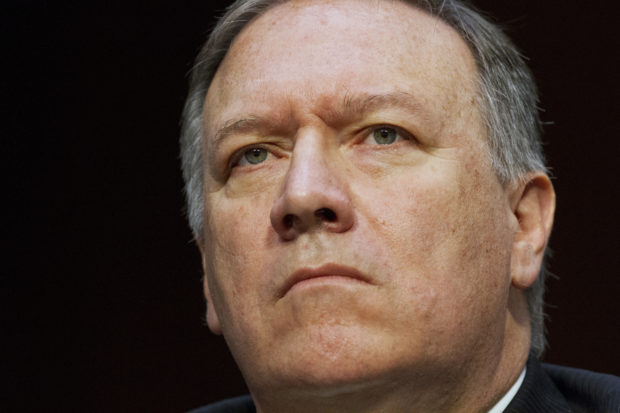
In this May 11, 2017, file photo, CIA Director Mike Pompeo listens while testifying on Capitol Hill in Washington, before the Senate Intelligence Committee. Pompeo says Russia is interested in staying in Syria, partly because they “love to stick it to America.” Asked if Russia is America’s friend or adversary, Pompeo replied: “It’s complicated.” AP FILE PHOTO
ASPEN, Colorado — Central Intelligence Agency (CIA) Director Mike Pompeo said Thursday that Russia has no plans to leave Syria and will continue to try to meddle in U.S. affairs to “stick it to America.”
He reiterated his belief that Russia interfered in the U.S. presidential election and described the U.S.-Russia relationship as “complicated.”
“I think they find anyplace that they can make our lives more difficult, I think they find that’s something that’s useful,” he said
Pompeo also said he has seen only minimal evidence that Russia has pursued a serious strategy against Islamic State militants in Syria. He said any suggestion that Russia has been a U.S. ally in Syria is not borne out by what’s happening on the ground.
But Pompeo said he was hopeful there will be places in the world where the U.S. and Russia can cooperate on counterterrorism.
He said it’s difficult to imagine a stable Syria with President Bashar Assad still in power. He called Assad a “puppet of the Iranians,” who now have a “significant foothold in Syria.”
Russia will stay in Syria, he said, because it loves its naval port in Tartus, off the Mediterranean Sea.
The CIA director spoke in a wide-ranging conversation at the Aspen Security Forum, an annual gathering of intelligence and national security officials and experts in Aspen, Colorado.
He said the Trump administration is working on ways to push back against Iran, which wants to be a “kingpin” in the Middle East.
Pompeo continued his criticism of the Obama administration’s nuclear deal with Iran. The Trump administration recently confirmed that Iran had met its obligations under the deal but warned it would face consequences for breaching “the spirit” of the accord — a reference to Iran’s continued pursuit of a ballistic missile program.
When it comes to Iranian compliance with the agreement, Iran is a “bad tenant,” Pompeo said. He likened their compliance with a renter who doesn’t pay rent until the landlord demands it and then sends a bad check. He noted that President Donald Trump has been working with Gulf states and Israel to find a common way to push back against Iranian aggression in the region.
What won’t work is appeasing Tehran or forcing them into compliance, he said.
“When we have our strategy in place, I’m confident you will see a fundamental shift in policy” toward Iran, Pompeo said.
Pompeo also addressed the threat from North Korea and said Trump asks questions about Pyongyang nearly every time he sees him.
“It is at the front of his mind,” Pompeo said.
It’s one thing for North Korea to have a missile that can harm the United States and another for it to have an arsenal of such weapons, he said, adding that things can be done to narrow its capacity to develop a stockpile.
While some people believe North Korea’s leader is irrational, Pompeo said he is convinced Kim Jong Un understands his core mission — “which is to keep himself in power.”
While he avoided saying the U.S. might favor a regime change, Pompeo said he’s “hopeful that we will find a way to separate that regime” from its nuclear capabilities.
“The North Korea people — I’m sure are lovely people — and would love to see him go as well. You know they don’t live a very good life there,” Pompeo said.
On another issue, Pompeo said he believes WikiLeaks will “take down America any way it can.” He noted that the anti-secrecy group’s website urges students to become CIA interns so they can become whistleblowers.
Pompeo acknowledged that Donald Trump said during the presidential campaign that he loved WikiLeaks.
“I don’t love WikiLeaks,” Pompeo said.
Besides Edward Snowden, a former National Security Agency contractor who leaked documents revealing extensive U.S. government surveillance, WikiLeaks has released nearly 8,000 documents that it says reveal secrets about the CIA’s cyberespionage tools for breaking into computers. WikiLeaks previously published 250,000 State Department cables and embarrassed the U.S. military with hundreds of thousands of logs from Iraq and Afghanistan./rga